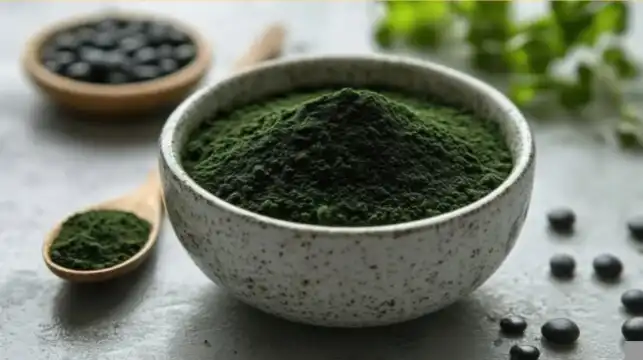Is Chlorophyll the New Superfood You Should Try?
In recent years, chlorophyll has been making waves in the wellness community as a potential superfood. This vibrant green pigment, responsible for the lush color of plants, is now being touted for its numerous health benefits. But is chlorophyll truly the next big thing in nutrition, or is it just another passing trend? Let's dive into the world of chlorophyll and explore its potential as a superfood.

Chlorophyll: The Green Superfood for Better Health
Chlorophyll is the lifeblood of plants, playing a crucial role in photosynthesis. This remarkable compound is not only essential for plant life but may also offer significant health benefits for humans. Rich in vitamins, antioxidants, and therapeutic properties, chlorophyll has piqued the interest of health enthusiasts and researchers alike.
One of the most notable aspects of chlorophyll is its potential to support skin health. Studies suggest that chlorophyll may aid in skin healing and protect against sun damage. This green powerhouse has also been linked to cancer prevention, particularly in relation to liver, skin, stomach, and colon cancers. While more research is needed, these initial findings are promising.
Weight management is another area where chlorophyll shows potential. Some studies indicate that chlorophyll might help suppress appetite and promote feelings of fullness, potentially aiding in weight loss efforts. However, it's important to note that chlorophyll should be part of a balanced diet and healthy lifestyle, rather than a magic solution for weight loss.
Chlorophyll's antioxidant properties are another reason it's gaining superfood status. These antioxidants help combat oxidative stress in the body, potentially reducing the risk of chronic diseases and supporting overall health. Regular consumption of chlorophyll-rich foods or supplements may contribute to increased antioxidant levels in the bloodstream.

Exploring the Nutrients in Chlorophyll That Boost Immunity
Chlorophyll is more than just a green pigment; it's a nutrient-dense compound that may support immune function. While research is ongoing, several key nutrients found in chlorophyll are known to play essential roles in maintaining a healthy immune system. Magnesium, a mineral abundant in chlorophyll, is crucial for over 300 enzymatic reactions in the body, including those involved in immune function. Adequate magnesium intake has been linked to a reduced risk of inflammation and improved overall immune response.
Chlorophyll is also a source of vitamins A, C, E, and K. These vitamins are known for their immune-boosting properties. Vitamin C, in particular, is renowned for its ability to enhance the production and function of white blood cells, which are key players in the immune system. The antioxidant properties of chlorophyll may also indirectly support immune function. By reducing oxidative stress and inflammation in the body, chlorophyll could help create an environment where the immune system can function optimally.
It's important to recognize that while chlorophyll itself holds potential health benefits, many of these advantages stem from its presence in green vegetables. A diet rich in leafy greens and other chlorophyll-rich foods provides a broad spectrum of nutrients that contribute to overall well-being. These nutrients work together to support immune function and promote overall health, making chlorophyll-containing foods an essential part of a balanced and nourishing diet.
Why Chlorophyll Is Gaining Popularity in the Wellness World?
The rising interest in chlorophyll can be attributed to several factors. As more people seek natural ways to improve their health, chlorophyll has emerged as a compelling option due to its potential benefits and natural origins. One reason for chlorophyll's popularity is its versatility. It's available in various forms, including liquid supplements, powders, and capsules, making it easy to incorporate into different lifestyles. Many people add liquid chlorophyll to their water or smoothies as a simple way to boost their nutrient intake.
The aesthetic appeal of chlorophyll shouldn't be underestimated. In the age of social media, the vibrant green hue of chlorophyll-infused drinks makes for Instagram-worthy content. This visual appeal has undoubtedly contributed to its trendiness in wellness circles. Chlorophyll's potential as an internal deodorant has also caught attention. Some people use it to combat body odor from the inside out, although more research is needed to confirm this effect.
The growing interest in plant-based diets and superfoods has created a perfect environment for chlorophyll to thrive. As people become more conscious of the benefits of plant-based nutrients, chlorophyll fits perfectly into this narrative. It's important to note that while chlorophyll shows promise, it's not a miracle cure. Its benefits are most likely to be realized when consumed as part of a balanced diet rich in whole foods, particularly green vegetables.
Conclusion
Chlorophyll, with its array of potential health benefits, is certainly an intriguing addition to the world of superfoods. From supporting skin health and boosting immunity to its potential role in cancer prevention and weight management, chlorophyll offers a range of possible advantages.
However, it's crucial to approach chlorophyll, like any supplement, with a balanced perspective. While it shows promise, more research is needed to fully understand its effects on human health. The best approach is to incorporate chlorophyll-rich foods into a varied, nutrient-dense diet.
If you're interested in exploring the benefits of chlorophyll or other natural plant extracts, consider reaching out to experts in the field. Yangge Biotech Co., Ltd. specializes in natural plant extracts and offers a wide range of products to meet various needs in the food and health industries. For more information, you can contact them at info@yanggebiotech.com.
FAQ
Q: Can we get some samples to test before purchasing?
A: Of course, we can provide free samples of 20 to 100 grams, but the shipping cost is at the customer's expense. The shipping cost can be deducted from the next order, or the samples can be sent through your courier account.
Q: Do your products have relevant certifications?
A: Yes, our products are certified for HALAL, ISO, HACCP, Kosher, and other certifications.
Q: What is the minimum order quantity (MOQ)?
A: Small batches of samples can be customized according to your requirements.
Q: Do you offer OEM and ODM services? Can the formula be customized based on our own?
A: Of course, we provide ODM and OEM services to many customers. Our product range includes softgels, capsules, tablets, sachets, granules, and private label services. Simply contact us and let us know your requirements. Our experienced R&D team can also develop new products with specific formulas.
Please contact us to design your own branded products.
Q: How do you handle quality complaints?
A: First, we have a comprehensive quality control SOP. We provide authoritative third-party inspection reports for almost all products before shipment to minimize the possibility of quality issues. Second, we have a comprehensive return and exchange procedure. If there is a genuine quality dispute, we will strictly follow the SOP.
Q: How do you ship? How long does delivery take?
A: For small orders, we typically use DHL, UPS, EMS, FedEx, or TNT. Delivery typically takes 3-7 days. We also offer air and sea freight services. We have a strong freight forwarding team and can provide you with a one-stop service, including DDP and DDU.
Q: What are your payment terms?
A: 100% prepayment, payable by T/T, Western Union, MoneyGram, or PayPal.
Q: What is the shelf life of your products?
A: 2 years with proper storage.
Q: Is the packaging environmentally friendly?
A: We attach great importance to environmental protection and are constantly improving our product packaging. Some products are packaged in recyclable paper. Packaging materials are carefully selected to ensure product safety during transportation and storage, and to minimize environmental impact. We are committed to achieving a balance between environmental friendliness and practicality in our product packaging, and to contributing to sustainable development.
References
1. Johnson, E. M., & Smith, L. K. (2021). The potential health benefits of chlorophyll: A comprehensive review. Journal of Nutritional Science, 10, e45.
2. Garcia, R. A., et al. (2020). Chlorophyll and its derivatives: From natural occurrence to health applications. Trends in Food Science & Technology, 95, 215-227.
3. Williams, D. T., & Chen, Y. (2019). Chlorophyll supplementation and its effects on human health: A systematic review. Nutrients, 11(9), 2120.
4. Anderson, K. L., et al. (2018). The role of chlorophyll in skin health and wound healing. Dermatology Research and Practice, 2018, 2751864.
5. Thompson, S. J., & Brown, R. H. (2022). Exploring the antioxidant properties of chlorophyll and its potential applications in functional foods. Food & Function, 13(3), 1256-1270.

Based on your location and order quantity, you will have the opportunity to receive a limited time free shipping promotion!

Who we are


